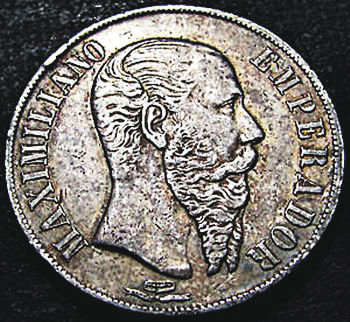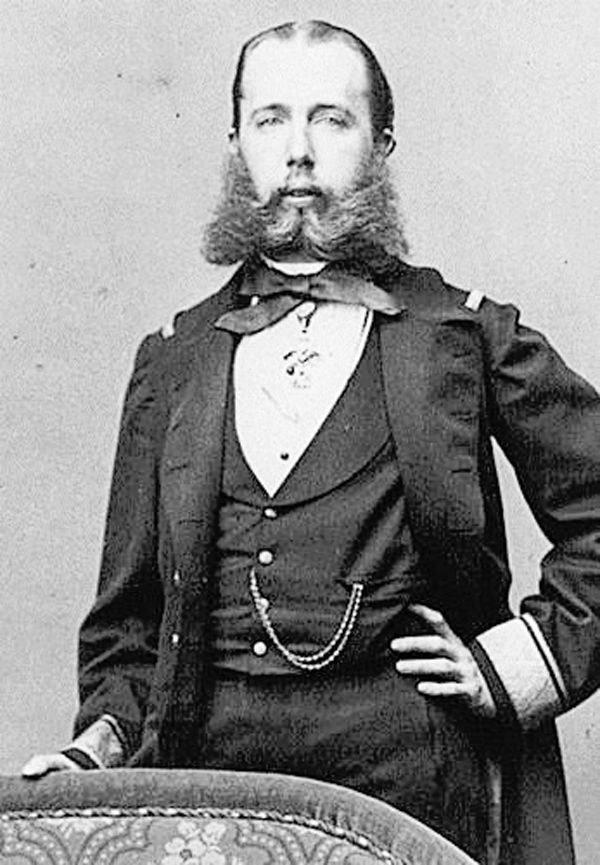BY NORMAN ROZEFF
In the meantime, French general Foray had conquered much of Mexico including the capital. Once here he reordered Mexican politics. Two hundred and fifty prominent conservatives were assembled and constituted as the government. They then abolished the Republic, declaring Mexico an empire.
Next they voted to offer the throne to Maximilian and deputized a delegation to be sent to Vienna. The British refused to go along with this charade. Maximilian had, in effect, become a pawn of Napoleon III. He would not honor his promise to furnish 20,000 troops through 1867 as the financial burden in doing so was too high.
France then tried to foist the cost of occupation onto Mexico. The issuance of bonds was, in realty, a bottomless sinkhole. Maximilian declared himself emperor on April 10, 1864. In doing so he relinquished all right to the Austrian throne and to his Hapsburg inheritance.
This was a major sacrifice, however he was optimistic about succeeding in Mexico. Likely he was too much a romanticist and not tough enough to deal with the contentious natives of Mexico who had suffered a long history of repression.
When Maximilian attempted to appropriate church property this pretty much severed his relationship with the papacy and clerics in Mexico. The supporters that Maximilian did have were largely in effectual politically. When the Catholic archbishop demanded the full reparation of all the properties which had been appropriated by the Reform movement Maximilian was reluctant to do so as he believed that this would be a major step backward. As a compromise, he did offer to pay clerical salaries from state revenues.
Maximilian spent considerable time and effort restoring the war-damaged National Palace and made the run-down Chapultepec Castle his royal residence and in doing so, a great national monument. He laid out an attractive boulevard to connect the palace and the capital. French forces, by 1865 now augmented by Belgian and Austrian soldiers, had reached the Rio Bravo (the Rio Grande of today). In chasing the elusive Juarez across the reaches of Northern Mexico, the French spread their army too thin. While Napoleon had 40,000 (another source says 30,000) troops in Mexico, he also had 20,000 in Rome to guard the Pope, and 80,000 more in a restive Algeria. As the Civil War drew to its close in May 1865, occupying Union forces ( 25,000 and perhaps more, largely Black soldiers because the nation did not know what to do with so many recently freed slaves), under the command of General Phillip H. Sheridan, north of the border surreptitiously furnished arms and ammunition to Juarez.
This was done out of the fear that a government under Maximilian and with a number of former Confederate States of America soldiers who had fled south of the border might try to invade the south and retake former CSA territory. The United States made it abundantly clear that the French would have to withdraw from Mexico. With pressure coming form the Prussians Napoleon realized that he would have to withdraw his army from Mexico and did so in 1866.
While Juarez was fighting what we term today, guerrilla warfare, he was wise enough not to openly confront a superior force in open battle. As Maximilian’s governmental position worsened, Napoleon made a last-ditch effort to overwhelm the Juarez forces. He ordered General Francois Bazaine to pursue
Juarez near the border. Bazaine, who had wished to instigate a reign of terror, had been stifled in this regard by Maximilian who wanted to offer carrots, not sticks. Finally Maximilian relented and signed a decree in October 1865 that would allow the execution of any Mexican taking up arms against the empire.
It had a negative effect, in that it made martyrs of the combatants and spurred more Mexicans to join the revolt. Early in 1866 the dire situation was compounded when Napoleon repudiated the April 1864 Miramar Convention with its secret articles and ordered all French troops to leave Mexico.
Maximilian sent his wife to Europe to plea for continued aid. Napoleon would not grant her an audience and as her father had died, her brother too refused to help. In September 1866, while having a meeting with Pope, Carlota exhibited many signs of paranoia derangement. The following month Maximilian accepted the fact that his wife was insane.
With the last French military force gone by March 1867, the Juarez forces quickly regained control of the majority of regions.
With 40,000 men, Juarez generals Escobedo and Corona advanced on strategic north central state of Queretaro. Maximilian opted to resist to the end. He had but 10,000 soldiers now under his command. Together with his loyal-to-the- end General Tomas Mejia, Maximilian moved to Queretaro which was being defended by General Miguel Miramon and about 5,000 soldiers.
The loyalists held out for an astounding seventy-one days. It was only when a treacherous defecting officer contacted Escobedo and revealed to him how to sneak in to the besieged city that the Juarista in a night attack overcame the emperor’s defenders. In true military etiquette the defeated Maximilian handed his sword to Escobedo. That was to be the extent of such courtesies. Juarez and treasurer Miguel Lerdo de Tejada wanted to sentence Maximilian to death. He was ordered to be brought before a military court martial consisting of seven junior army officers. Staged in a theater, Maximilian refused to defend himself.
His very self-control and calmness led three of the judges to vote against the death penalty, this actually in reverse of what they had been instructed to do. The court judge broke the three to three tie, so Maximilian faced execution but believed he would be allowed to leave Mexico unharmed. Some in the international community sought clemency (including the liberator of Italy, Girabaldi), however Juarez was steadfast in believing that an execution would serve as an object lesson that Mexico was a sovereign nation.
On June 19 bugles and drums signaled that the day of reckoning had arrived. Maximilian, Miramon, and Mejia were taken to Cerro de las Campanas to face a firing squad. With unbelievable dignity and composure Maximilian demanded that Miramon take the place of honor at the center. He then gave each of the soldiers in the firing squad a gold piece. Finally he comforted Mejia. He died as Hidalgo did crying out “Viva Mexico.” Thus ended Napoleon’s failed incursion into Mexico.
Maximilian’s poorly embalmed body was taken back to Austria on a warship. He was buried alongside his ancestors in Vienna. Later an undistinguished little chapel was erected by the Hapsburgs at the site of the execution. It was neglected over time and greatly overshadowed by the erection of a huge and unflattering statue of Benito Juarez.






